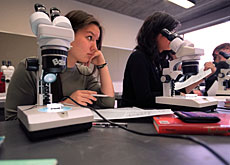Swiss graduates get mixed report

The proportion of Swiss graduates has more than doubled since 2000, but the figure remains well below the international average, according to a study on Tuesday.
In its annual “Education at a Glance” survey, the Organisation for Economic Cooperation and Development (OECD) also revealed that Switzerland came 31st out of 32 countries regarding the number of women on science and maths-based courses.
The latest report by the Paris-based organisation shows that 27 per cent of young Swiss completed university courses in 2005 – up from nine and 12 per cent in 1995 and 2000 respectively.
However, this was still clearly below the OECD average of 36 per cent.
By contrast, more than 45 per cent of young people now graduate in Australia, New Zealand, Denmark and Poland. Although in Germany and Austria, where courses are longer, only around 20 per cent of young people get degrees.
The figure in the United States was unchanged at 34 per cent and in Britain slightly up at 39 per cent.
According to the Federal Statistics Office, which published the report, this 76 per cent increase in Switzerland is the fruit of “fundamental” higher education reforms and the development of technical universities.
Increased spending
“Between 1995 and 2004 expenditure in tertiary graduation grew by 76 per cent in Switzerland, which is well above the OECD average,” Ben Jensen, an education analyst at the OECD, told swissinfo.
Between 1995 and 2004, spending on education increased by 42 per cent on average in OECD countries as more people than ever completed secondary and university education.
“Spending per student in education in Switzerland is quite high in the OECD in terms of overall expenditure,” added Jensen. “But growth in tertiary expenditure has been quite substantial as well.”
OECD analyst Andreas Schleicher said countries that had invested in higher education and the “knowledge economy” had bright futures.
“What you have seen are these countries making such an improvement in their investment, they are certainly better off,” he said.
Bad science
The report also found university graduates earned more money and found jobs more easily than people who did not have degrees.
But disparities between the sexes still remain. Although these gender differences in Switzerland had in general got smaller, the dearth of female maths, science and technology graduates is cause for serious concern.
An average of 32 per cent of maths and science graduates in OECD countries are female – the figure hits 40 per cent in Bulgaria, Portugal, Estonia and Greece – but in Switzerland only one in six Swiss graduates on science or maths-based courses is female, half the OECD average.
Only Japan, on 14 per cent, saved Switzerland’s blushes.
Despite this, Jensen draws a relatively positive balance of Switzerland’s educational situation.
“There is nothing in ‘Education at a Glance’ that shows that Switzerland is seriously failing here or there,” he concluded.
“It actually shows something that you quite rarely see in these overall figures – the fact that extra money in Switzerland has led to an increase in tertiary graduation rates. This doesn’t happen in many countries and it definitely doesn’t show up as quickly in the statistics. I think that can be seen as quite a success.”
swissinfo, Thomas Stephens
The Swiss education system is undergoing a series of major reforms to make it more competitive globally.
Swiss higher education institutions began to implement the Bologna Declaration in 2001/2 by introducing new Bachelor and Master degree courses. The Bologna system is a European-wide harmonised tertiary education format that applies a two-step (Bachelor and Masters) approach.
A referendum in May 2006 passed government proposals to enhance coordination between different cantonal school systems and to give the federal authorities a bigger say in setting the educational agenda in future.
Founded in 1961, the Organisation for Economic Cooperation and Development has 30 member countries.
It succeeded the Organisation for European Economic Cooperation, which was formed to administer United States and Canadian aid under the Marshall Plan for reconstruction of Europe after the Second World War.
Its mission is to build strong economies in its member countries, improve efficiency and expand free trade.
The secretariat in Paris has a staff of about 2,000, including about 700 economists, lawyers, scientists and other professionals, who provide research and analysis.
Switzerland has been a member since 1961.

In compliance with the JTI standards
More: SWI swissinfo.ch certified by the Journalism Trust Initiative












You can find an overview of ongoing debates with our journalists here . Please join us!
If you want to start a conversation about a topic raised in this article or want to report factual errors, email us at english@swissinfo.ch.